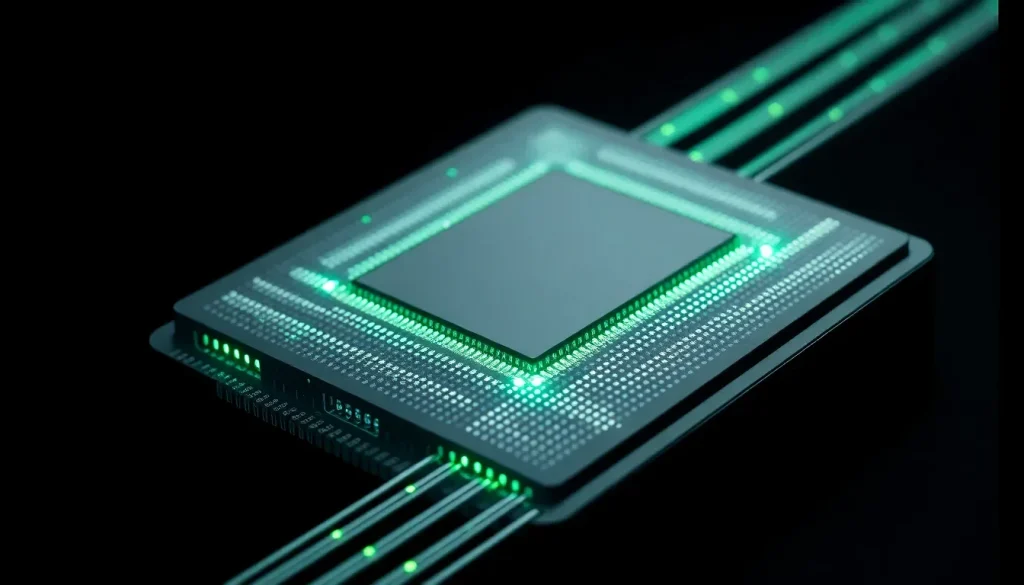NVIDIA Blackwell AI Chip Approval in China Boosts Market Share

The landscape of AI technology and international trade is shifting rapidly, especially as major players like NVIDIA seek opportunities in restrictive markets. The potential approval of NVIDIA's Blackwell AI chip for the Chinese market could be a significant game-changer, especially in light of the upcoming discussions between President Trump and President Xi Jinping. Let's explore the implications of this development in detail.
- NVIDIA's Blackwell AI chip: a pivotal discussion point in the Trump-Xi meeting
- What is the B30A AI chip and its significance?
- Challenges and opportunities for NVIDIA in the Chinese market
- Implications of the trade discussions on NVIDIA's future
- Could NVIDIA sell AI chips to China despite the restrictions?
- The future of NVIDIA in the global AI market
NVIDIA's Blackwell AI chip: a pivotal discussion point in the Trump-Xi meeting
NVIDIA has faced numerous challenges in China, particularly following escalating tensions between the United States and China. However, recent reports suggest that there may be a glimmer of hope for NVIDIA's market presence in the region. As highlighted by Bloomberg, President Trump has indicated that the upcoming meeting with Xi Jinping will include discussions regarding the Blackwell AI chip, which could be critical for a successful trade deal.
This potential breakthrough isn’t just about chip technology; it signifies a larger step towards easing trade tensions. Trump's remarks include a commitment to reducing tariffs on Chinese goods, which may open the door for NVIDIA's return to a market from which it has largely withdrawn. CEO Jensen Huang has openly stated that NVIDIA's market share in China has dwindled to almost nothing, citing a drop from a dominant 95% to a stark 0%.
“The next AI chip solution for China must be based on Blackwell architecture, as the previous Hopper lineup is no longer viable for the market,” said Jensen Huang, emphasizing the necessity of innovation for regaining foothold.
In light of this, the prospect of the B30A AI chip is particularly exciting. Built on advanced specifications, this chip could redefine NVIDIA's strategy in the Chinese market.
What is the B30A AI chip and its significance?
Rumored to be a successor to the H20 AI chip, the B30A is set to incorporate several cutting-edge features:
- 8-Hi HBM3E Memory: This high-bandwidth memory technology enhances data transfer speeds, crucial for AI processing.
- TSMC's N4P Process: Utilizing a more efficient manufacturing process can lead to better performance and energy efficiency.
- NVLink Interconnect: This feature allows for enhanced communication between multiple GPUs, improving overall computational power.
- Dual-die Design: A shift from the monolithic design of previous models, enabling greater scalability and performance.
These enhancements position the B30A on par with NVIDIA's more advanced chip configurations, such as the B200 and B300, which are crucial in maintaining competitive advantage in the AI market.
Challenges and opportunities for NVIDIA in the Chinese market
Despite the potential opportunities, NVIDIA faces several challenges as it navigates the complexities of the Chinese market:
- Regulatory Hurdles: The Chinese government has strict regulations regarding foreign technology, which could impede NVIDIA’s plans.
- Competition: Local companies like Alibaba and Huawei are rapidly advancing in AI technologies, creating stiff competition.
- Geopolitical Tensions: Ongoing tensions between the US and China could affect trade policies, impacting NVIDIA’s operations.
To overcome these challenges, NVIDIA must not only innovate but also build strategic partnerships within China. Collaboration with local tech firms could facilitate smoother entry into the market and enhance its credibility among Chinese consumers.
Implications of the trade discussions on NVIDIA's future
The outcome of the Trump-Xi meeting could significantly influence NVIDIA's trajectory in the Chinese market. Should the discussions lead to favorable conditions for trade, NVIDIA might witness a resurgence in market share and revenue from China. Analysts predict that this could result in:
- A Boost in Revenue: Access to the Chinese market could lead to substantial financial gains for NVIDIA.
- Market Repositioning: Regaining a foothold in China may allow NVIDIA to reposition itself as a leader in AI technology.
- Increased Innovation: A strong presence in China could drive NVIDIA to innovate further, enhancing its product offerings globally.
As the tech world watches these developments closely, NVIDIA's ability to adapt and thrive in this environment will be pivotal for its future success.
Could NVIDIA sell AI chips to China despite the restrictions?
Despite the challenges, there is potential for NVIDIA to resume sales of AI chips to China. The company has indicated interest in navigating the regulatory landscape and finding a way to re-establish its presence. The approval of the Blackwell AI chip could signal a thawing of relations that would allow NVIDIA to capitalize on the burgeoning demand for AI technologies in China.
In the context of this potential approval, it’s essential to understand the broader implications of AI technology in the global market:
- Economic Growth: AI technologies are crucial for driving economic growth, particularly in rapidly developing markets like China.
- Technological Leadership: Companies that lead in AI technology will likely shape the future of various industries, from healthcare to finance.
- Global Collaboration: Effective collaboration between countries can enhance innovation and address global challenges.
NVIDIA's ability to penetrate the Chinese market with its AI chips could set a precedent for other companies seeking to expand their reach in similar restrictive environments.
The future of NVIDIA in the global AI market
As NVIDIA positions itself for a potential comeback in China, the company must also remain vigilant about global market trends. The AI sector is rapidly evolving, with significant advancements being made by competitors worldwide. To maintain its leadership, NVIDIA will need to focus on:
- Continuous Innovation: Investing in research and development to stay ahead of technology curves.
- Expanding Partnerships: Collaborating with other tech firms to drive innovation and share resources.
- Adapting to Market Needs: Understanding the needs of various markets and tailoring products accordingly.
As NVIDIA navigates this complex landscape, its future in the global AI market will depend on its strategic decisions and ability to leverage opportunities presented by changing geopolitical dynamics.
For more insights on the evolving tech landscape and NVIDIA's strategies, check out this intriguing video:




Leave a Reply